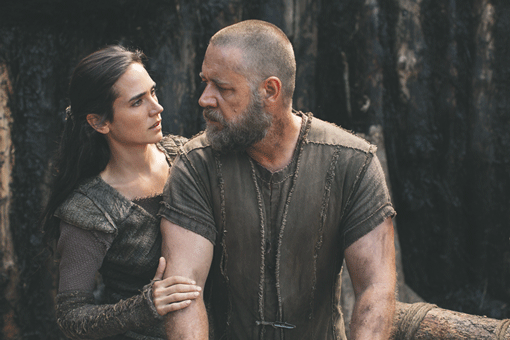The film loosely based on the biblical story of Noah’s Ark comes with a disclaimer that it ‘is true to the essence, values, and integrity of a story that is a cornerstone of faith for millions of people worldwide’
Reviewed by REBECCA KANNER
In February, Faith Driven Consumer (faithdrivenconsumer.com) conducted a survey that found that 98 percent of its supporters were not “satisfied” with Hollywood’s take on religious stories such as Noah. The survey question posed was: “As a Faith Driven Consumer, are you satisfied with a biblically themed movie — designed to appeal to you — which replaces the Bible’s core message with one created by Hollywood?”
On Feb. 17, more than a month before Noah’s March 28 release, Variety published the results of the survey, declaring that “Noah may face some rough seas with religious audiences, according to a new survey by Faith Driven Consumer.” The media ran with this story, casting doubt on Noah’s chances at the box office.

I followed all of this with heightened anticipation. The promotion of my own book hinged on projections of the movie’s success. Sinners and the Sea: The Untold Story of Noah’s Wife was written years before Noah, the movie, came out, and my book was published 11 months earlier.
Usually publishers wait a year after the hardcover is released to release the paperback; but my publisher decided to release the paperback two months early in order to take advantage of the increased interest in the story of the flood that was expected to come from the movie publicity. But when the industry started casting doubt over the success of Noah due to some very vocal conservative Christians (such as Ken Ham, the president/CEO and founder of Answers in Genesis-U.S. and the Creation Museum), my publisher’s sales reps decided it wouldn’t be a good idea to pitch a Noah movie-themed promotion to Barnes & Noble and other retailers.
Paramount Pictures and Noah director Darren Aronofsky, already at odds over the concessions Paramount was willing to make to religious audiences, reportedly experienced increased tensions over a disclaimer that Paramount appended to both the film and promotional materials at the urging of the National Religious Broadcasters (NRB).
The disclaimer reads, in part, that the film “is inspired by the story of Noah. While artistic license has been taken, we believe that this film is true to the essence, values, and integrity of a story that is a cornerstone of faith for millions of people worldwide. The biblical story of Noah can be found in the book of Genesis.”
Terrified by the power a vocal minority was being allowed to wield, I cheered Aronofsky on at every turn. Whether or not my novel received any sort of boost from Noah, I wanted to love it. And so I flinched a few times while watching it. I didn’t see any concessions to Christian conservatives in the film. What I saw were concessions to the marketplace.
The giant rock monsters that appeared early on were so completely out of place that the most plausible explanation for their inclusion in the film seemed to be that somehow the rock monsters from The Hobbit had stumbled awkwardly onto the screen and were so heavy that instead of trying to move them Aronofsky decided to make some strange use of them.
Foreign markets tend to like special effects, and most movies with computer-generated imagery (CGI) make more overseas than domestically. If you look at a list of the top-grossing movies you’ll see no shortage of CGI-heavy films. So I was not surprised by the CGI in Noah.
Other than the rock monsters, the CGI was believable and as tasteful as any other elements in a movie that aspires to be a blockbuster. Aronofsky’s CGI animals may have saved a number of actual animals’ lives. Over two dozen animals were injured or killed during the production of some of last year’s biggest blockbusters, including Life of Pi and The Hobbit: An Unexpected Journey.
As for the accusations that Noah is environmentalist propaganda, Russell Crowe’s Noah did show a concern for animals that felt incredibly sincere, and true to Genesis. Noah and his family did not eat animals in the movie. (It’s not until after the flood, in Genesis 9:2, that God says, “The fear and the dread of you shall be upon all the beasts…”) I thought this gentle side of Noah was important to show, especially as later in the movie Noah isn’t easy to love.
While Noah’s concern for animals is unwavering, his faith in humanity dips to precipitously low levels. The extremes to which Aronofsky pushes Noah’s character makes the movie objectionable to some Christians and makes the second half of the movie difficult to watch. For a couple of days after seeing it, I thought of it obsessively. Noah was willing to go to terrible lengths to satisfy a God who did not even bother to be clear in His message.
In the Torah, neither God nor the people He chose to carry out important tasks were easy to understand. In Sinners and the Sea, I, too, had Noah wrestle with a God who was seemingly absent, while the other characters wrestled with Noah himself, a man so insane he thought God was talking to him.
Though Noah is sometimes difficult to watch, I recommend it to anyone who likes to grapple with hard questions. I will continue thinking about the mysterious, sometimes wrathful and sometimes forgiving nature of the God found in Torah, and about the struggles of a people seeking to hear His barely audible messages.
***
Rebecca Kanner, a St. Paul native, is the author of Sinners and the Sea: The Untold Story of Noah’s Wife, which was reviewed in the American Jewish World last year (3-29-13 AJW).
(American Jewish World, 4.11.14)



















